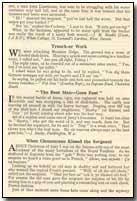Memoirs & Diaries - The Best 500 Cockney War Stories - The Best Man - Goes Fust and Other Stories
 Published in London
in 1921, The Best 500 Cockney War Stories
comprised, in the words of its newspaper publisher (The London Evening
News) "a remembering and retelling of those war days when laughter
sometimes saved men's reason".
Published in London
in 1921, The Best 500 Cockney War Stories
comprised, in the words of its newspaper publisher (The London Evening
News) "a remembering and retelling of those war days when laughter
sometimes saved men's reason".
The collection of short memoirs, some 500 in total, is divided into five categories - Action, Lull, Hospital, High Seas and Here and There. This page contains five stories from Action, led by The Best Man - Goes Fust.
Other sections within the collection can be accessed using the sidebar to the right.
The Best Man - Goes Fust
In the second battle of Arras, 1917, our regiment was held up near Gavrelle and was occupying a line of shell-holes.
The earth was heaving all around us with the heavy barrage. Peeping over the top of my shell-hole I found my neighbours, "Shorty" (of Barnes) and "Tiny" (of Kent) arguing about who was the best man.
All of a sudden over came one of Jerry's five-nines. It burst too close to "Shorty," who got the worst of it, and was nearly done for. But he finished his argument, for he said to "Tiny" in a weak voice, "That shows you who's the best man. My ole muvver always says as the best goes fust."
J. Saxby, Paddington, W.2
When Clemenceau Kissed the Sergeant
About Christmas of 1917 I was on the Somme with one of the most Cockney of the many battalions of the Royal Fusiliers.
As we sheltered in dug-outs from the "gale" Fritz was putting over, to our surprise we heard a voice greet us in French, "Allons, mes enfants: Ca va toujours."
Looking up we beheld an old man in shabby suit and battered hat who seemed the typical French peasant.
"Well, of all the old idiots," called out the sergeant. "Shut yer face an 'ook it, ye blamed old fool."
For answer the old man gave the sergeant the surprise of his life by seizing him in a grip of iron and planting a resounding kiss on each cheek, French fashion.
Just at that moment some brass hats came along and the mystery was explained.
The "old fool" was the late Georges Clemenceau, then French War Minister, who had come to see for himself what it was like in our sector and had lost his guides.
"An' to think that 'e kissed me just like I was a kid, after I'd told 'im to 'ook it," commented the sergeant afterwards. "Wonder wot 'e'd 'a done 'ad I told 'im to go to 'ell, as I'd 'alf a mind to."
Years later I was one of a party of the British Legion received in Paris by "The Tiger," and I recalled the incident.
"Pere La Victoire" laughed heartily. "That Cockney sergeant was right," he said, "I was an old fool to go about like that in the line, but then somebody has got to play the fool in wartime, so that there may be no follies left for the wise heads to indulge in."
H. Stockman, Hotel Terminus, Rue St. Lazare, Paris, VIIIeme, France
Poet - and Prophet
I was sitting with my pal in the trenches of the front line waiting for the next move when I heard our Cockney break into the chorus of a home-made song:
"'Twas moonlight in the trenches,
The sky was royal blue,
When Jerry let his popgun go,
And up the 'ale 'ouse flew."
The last words were drowned in a terrific crash. There was sudden quiet afterwards, and then a voice said, "There y'are, wot did I tell yer?"
T. E. Crouch, 28 Eleanor Road, Hackney, E.8
Pub That Opened Punctually
It was at the village of Zudkerque, where Fritz had bombed and blown up a dump in 1916.
My pal and I were standing outside a cafe, the windows of which were shuttered, when the blast of a terrific explosion blew out the shutters. They hit my pal and me on the head and knocked us into the roadway.
My pal picked himself up, and, shaking bits of broken glass off him and holding a badly gashed head, said: "Lumme, Ginger, they don't 'arf open up quick 'ere. Let's go an 'ave one."
J. March (late R.E.), London, S.E.
That Precious Tiny Tot
We had paraded for the rum issue at Frankton Camp, near Ypres, when the enemy opened fire with long-range guns.
A Cockney came forward with his mug, drew his issue, and moved off to drink it under cover and at leisure.
Suddenly a large shell whooped over and burst about 40 yards away. With a casual glance at the fountain of earth which soared up, the man calmly removed his shrapnel helmet and held it over his mug until the rain of earth and stones ceased.
"Skipper," D.L.I., London, W.2
Next - Cigs and Cough Drops and four other stories
"Hun" was a slang term used by the allies, to describe the Germans. "Boche" was another.
- Did you know?
